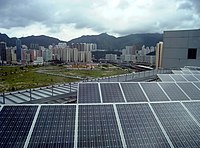
Photo from wikipedia
Abstract Drying is necessary for wood biomass to be used in various applications such as heating. This work aims to assess the energy and performance of a hybrid solar dryer… Click to show full abstract
Abstract Drying is necessary for wood biomass to be used in various applications such as heating. This work aims to assess the energy and performance of a hybrid solar dryer for woody biomass. The study is carried out by establishing the energy and mass balance in a prototype hybrid kiln. A mathematical model for predicting heat and mass transfer during the biomass drying process is developed and validated. The drying parameters are evaluated for a hybrid solar kiln witch integrate a heat pump and a condensing gas boiler. The results show that the energy consumption ratio decreases as the set-temperature increases. The combined use of a solar air collector and a heat pump allows a reduction of 52, 37 and 24% in terms of drying time for the three set temperatures 50, 60 and 70 °C, respectively. The use of a recycled air fraction of 75% in the hybrid solar dryer has the effect of reducing the energy consumption up to 84% and improving the drying efficiency by 92%. The results also show that the moisture extraction rate and the specific moisture extraction rate decrease as the bed height/wood chip effective diameter ratio increases. The use of a porous medium with an optimal vacuum rate is also desirable in order to improve the thermal performance of the drying system. The overall results show that the combined use of a solar air collector and a heat pump is an effective solution to reduce energy consumption and improve thermal performance during the biomass drying process.
Journal Title: Energy
Year Published: 2020
Link to full text (if available)
Share on Social Media: Sign Up to like & get
recommendations!